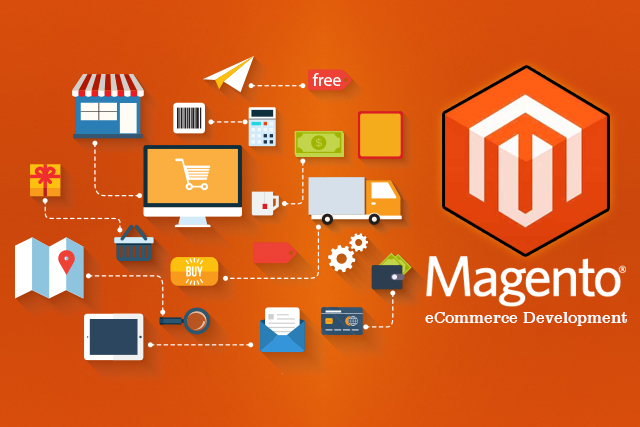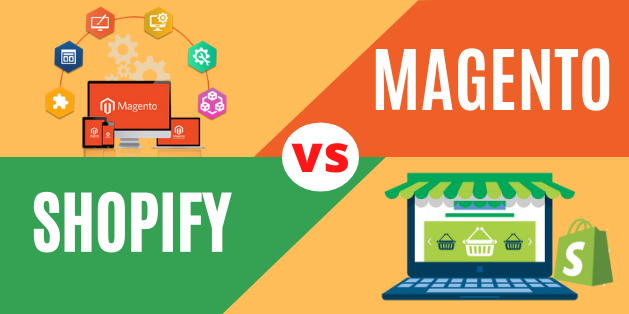Table of Contents
Choosing the right eCommerce platform is crucial for any business, whether it’s a small start-up or a large corporation. Two of the most popular eCommerce platforms are Shopify and Magento, which always stay rivals when it comes to the best option for startup entrepreneurs, or simply when someone wants to migrate their store. Both offer a range of features and benefits that can help businesses create and manage their online store. However, each platform has its strengths and weaknesses. In this article, we will compare Shopify and Magento, and help you choose the right platform for your business.
Table of Contents
1) Overview of Shopify vs Magento
Shopify: An Overview
Shopify is a cloud-based eCommerce platform that allows businesses to create and manage their online store. It is one of the most popular eCommerce platforms, with over one million businesses using the platform. Shopify offers a range of features and benefits that make it an attractive option for businesses of all sizes.

Magento: An Overview
Magento is an open-source eCommerce platform that is used by some of the world’s largest online retailers. It is a more complex platform than Shopify, but it offers more customization options and flexibility. Magento is popular among businesses that require a high level of customization and control over their eCommerce store.
Shopify vs Magento brief of features
Here is a list of features offered by Shopify and Magento:
Shopify
- User-friendly interface: Shopify has a user-friendly interface that is easy to navigate and use.
- Mobile-friendly: Shopify is optimized for mobile devices and offers responsive design.
- App store: Shopify has an app store with a variety of free and paid apps to add functionality to your store.
- Payment gateways: Shopify offers a range of payment gateway options, including Shopify Payments, which eliminates transaction fees.
- Hosting: Shopify hosts your website on its servers, eliminating the need for separate web hosting.
- Security: Shopify is Level 1 PCI compliant, providing secure transactions for customers.
- Customer support: Shopify offers 24/7 customer support via live chat, email, and phone.
Magento
- Customization: Magento offers advanced customization options for the design and functionality of your store.
- Large community: Magento has a large and active community of developers and users.
- Open-source: Magento is open-source, which means you can modify the code to meet your specific needs.
- Extensions: Magento offers a range of extensions to add functionality to your store, including free and paid options.
- Multi-store support: Magento supports multiple stores with a single installation.
- SEO-friendly: Magento is optimized for search engines, with built-in features such as meta tags and URL rewrites.
- Scalability: Magento is a scalable platform, suitable for businesses of all sizes.

Both Shopify and Magento offer a range of features to help businesses run their eCommerce operations. The choice between the two platforms will ultimately depend on the specific needs and budget of the business. With these differences in mind, here’s our head-to-head comparison of Magento vs Shopify.
2) Ease of use comparision between Shopify vs Magento
When it comes to the time and effort it takes to set up your new store, Shopify exceeds Magento in every way.
Shopify
Shopify is far easier to use than Magento. It’s a fact. Shopify is a one-stop-shop, drag-and-drop website builder, which means you can easily customize your store by moving elements around the page exactly how you want.
Meganto
With Magento, the learning curve is pretty steep compared to Shopify. You’ll have to interpret the jargon and use code in order to build the online store you want, or hire a web developer to build the store for you.
Also, since Magento is not a hosted solution, procuring your own hosting and setting up your store with it are processes that typical end-users would not find easy or convenient to do on their own.
When I look at Magento vs Shopify and consider ease of use, it’s a no-brainer. Shopify wins.
3) Features comparision between Shopify vs Magento
Basic Online Store Functionality
Both Shopify and Magento offer basic store functionalities that are fairly powerful to use and maintain on an ongoing basis.
Shopify is significantly easier to set up and use when compared to Magento. You’ll find that basic features like shopping carts, checkout modules, collections, and product pages are all included with both Magento and Shopify.
The main difference is that Magento has far more intermediate and advanced features built into the system. With Shopify, you often have to get an app for extended functionality.
Inventory Management
All Shopify plans allow for unlimited products in your store. Magento also lets you create and sell an unlimited number of products. You can easily create products and collections on both of the platforms, but the reason Shopify gets the thumbs up on this one is because of its direct integration to dropshipping inventory apps like Oberlo.
It should be noted here though, that while Magento allows a virtually unlimited number of products, your host (server) performance and site loading speed might turn out to be serious issues if you add too many products to your Magento store – something you don’t have to worry about with Shopify, since it is a fully managed and hosted solution.
Calculation of shipping charges
Both platforms allow flexible and powerful options for the calculation of shipping charges–which is one of the most basic and essential aspects of selling physical goods via an e-commerce storefront. Shopify also integrates with some dropshipping tools (with shipping estimates) and more exact shipping calculators, which might be helpful if you’re trying to be as accurate as possible for your customers.
Payment gateway options
Shopify has a major edge here, with support for over 70 payment gateways while Magento is relatively at a disadvantage with support for a far lower number of gateways.
More gateways, however, can be added to Magento store via third-party add-ons. The main problem I see with Shopify is that it kind of forces you to go with its built-in payment gateway. Shopify’s gateway has 0% transaction fees, while they make you pay fees for third-party gateways.
Themes and Templates
Both Shopify and Magento offer a large collection of themes and templates, especially a good number of responsive templates, to give your online store a look and feel to suit your products and taste. While the number of free themes provided by Shopify is significantly smaller than that of Magento Open Source, it can be noted that the free Shopify themes are generally more contemporary as compared to the themes offered by Magento Open Source.
Both offer paid/premium themes but here, Shopify is at a great disadvantage, with premium themes starting at $80, while Magento paid themes start at – an almost unbelievable – $1!
Apps and Add-ons
Well over 100 apps and add-ons are available for Shopify. The apps for Shopify assist in enhancing and expanding the functionality of your online store in various ways. The Shopify App store is constantly growing, with apps for things like loyalty programs, accounting, and email marketing. Shopify also moderates its app store pretty well, so you’re not going to install some junk app that’s going to damage your site.
Magento, again, is at a strong advantage here, with a whopping 5000+ apps and add-ons. This is primarily because of the large, open-source, community-driven nature of the platform. A mix of free, as well as paid apps/add-ons, are available for both platforms.
In general, you should be able to find free apps for pretty much all tasks on both platforms. I often stumble upon premium apps on Shopify, but then complete a quick search to locate something similar and free.
Customization Options
Customization options are one of the main differences between Shopify and Magento. Both platforms offer a range of customization options, but the level of customization available differs between the two platforms.
Both platforms offer robust customization capabilities, via an advanced interface that allows you to edit the raw HTML/CSS code directly to give you total control over the design and the look-and-feel of your store.
However, as mentioned above, Shopify scores better here by providing a simple, menu-driven method to change the basic attributes of your store such as fonts, colors etc. very easily while the customization capabilities with Magento are as high as it can get because all its code is open source, any of which you can modify in any way you wish to. Albeit, this unrestricted freedom to customize can be used only by those who have deeply entrenched web programming and HTML/CSS coding know-how.
Also, Shopify offers a theme editor that allows you to play around with the look and feel of your theme, and it has the ability to hide sections, so that you can work on future updates beforehand without having to duplicate the theme, or work on a staging server.
Finally, Shopify provides drag and drop sections, which are nice for organizing the content on your website. It’s nothing like an actual drag and drop builder, but it makes for a much easier design interface when compared to Magento.
Overall, Shopify is a better option for businesses that require a user-friendly platform with basic customization options. It is an excellent choice for small to medium-sized businesses that need a simple, easy-to-use eCommerce platform. On the other hand, Magento is better suited for larger businesses that require a high level of customization and control over their eCommerce store. Magento is an excellent choice for businesses that need a highly customizable platform with advanced functionality.
Shopify vs Magento developers
Shopify and Magento have different development ecosystems, with unique sets of developers and resources available to businesses.
Shopify has a large community of developers who specialize in the Shopify platform. The Shopify development community is growing rapidly, with many developers offering customized themes and plugins for the platform. Shopify also provides a dedicated Shopify Experts program, which connects businesses with certified Shopify developers who can help with various aspects of store setup and customization. Shopify’s developer ecosystem is geared towards creating a user-friendly platform that is easy to customize and manage.
Magento, on the other hand, is an open-source platform that offers a wide range of customization options. As a result, the Magento development community tends to be more technical and specialized than the Shopify community. Magento developers require a high level of technical expertise in web development, PHP, and MySQL to work with the platform. Magento offers a marketplace for extensions and plugins, which can be used to enhance the functionality of the eCommerce store. Magento also has a dedicated developer program, which provides resources and tools to developers who work with the platform.
Ecommerce business
One of the main advantages of Shopify is its user-friendliness. The platform is designed to be easy to use, even for those with little to no web development experience. This makes it an excellent choice for small to medium-sized businesses that want to get their eCommerce store up and running quickly. Shopify offers a range of tools and features that can help businesses manage their inventory, process payments, and track sales data. The platform also offers excellent customer support, with 24/7 live chat and phone support available to help businesses with any issues they may encounter.

Magento, on the other hand, is a more complex platform that offers a higher level of customization and control over the eCommerce store. While the platform can be more challenging to set up and manage, it offers advanced features and functionalities that can be highly beneficial to larger businesses. Magento offers a range of powerful tools to help businesses manage their inventory, process payments, and analyze sales data. The platform also allows for advanced customization, with the ability to create custom extensions and plugins to enhance the functionality of the eCommerce store.
Another factor to consider when comparing Shopify vs Magento for running an eCommerce business is the cost. Shopify offers a range of pricing plans, starting from a basic plan with a transaction fee and limited features, to more advanced plans with additional features and no transaction fee. Magento, on the other hand, is an open-source platform, which means there is no cost to use the software itself. However, businesses will need to pay for web hosting, development costs, and any third-party extensions or plugins they wish to use.
Sending automatic emails to customers
Both Shopify and Magento offer tools and features to help businesses send automatic emails to customers. However, the specific capabilities and ease of use of these tools differ between the two platforms.
Shopify offers a range of built-in email marketing tools, including automated abandoned cart recovery emails and order confirmation emails. These tools are easy to set up and use, with pre-designed templates available to help businesses get started quickly. Shopify also integrates with a range of third-party email marketing services, such as Mailchimp, which can be used to create and send more advanced email campaigns.
Magento also offers a range of email marketing tools. However, these tools are generally more complex to set up and use than Shopify’s built-in tools. Businesses will need to have some technical knowledge or work with a Magento developer to take full advantage of these tools. Magento also offers integrations with third-party email marketing services, such as Sendinblue, to provide more advanced email marketing capabilities.
In terms of customization, Magento offers more advanced options for businesses to create custom email templates, which can be highly beneficial for larger businesses with more specific branding requirements. Shopify also offers some customization options for email templates, but they are more limited compared to Magento.
Customer support
Customer support is an important factor to consider when choosing an eCommerce platform.
The more easily you can fix issues with your online store, the sooner you can get back to making sales and gaining new customers. That’s why the help and support options for your chosen platform must tick certain boxes. Thankfully, Shopify and Magento certainly do tick plenty:
- 24/7 phone support
- Social media support
- 24/7 live chat support
- Community forum
- Email support
- Help center
- Video tutorials
- Advanced specialist support
4) MAGENTO VS SHOPIFY: PROS AND CONS
SHOPIFY PROS |
SHOPIFY CONS |
|---|---|
|
|
|
|
|
|
|
|
|
|
|
|
|
MAGENTO PROS |
MAGENTO CONS |
|---|---|
|
|
|
|
|
|
|
|
|
5) MAGENTO VS SHOPIFY: WHICH ONE IS BEST FOR YOUR ONLINE STORE?
While both Shopify and Magento are fairly powerful e-commerce platforms, Shopify provides greater ease of use since it is a hosted and fully managed service.
Magento, while free itself, requires you to purchase hosting and carry out all the software/system setup and installation procedures yourself – something that only fairly tech-savvy people (and not typical end-users) would be able to do.
In light of this, as well as some of the points discussed above, Shopify comes out a winner as an e-commerce platform for building your online store with maximum ease of use and powerful capabilities.
Still, the choice is always yours to make.









